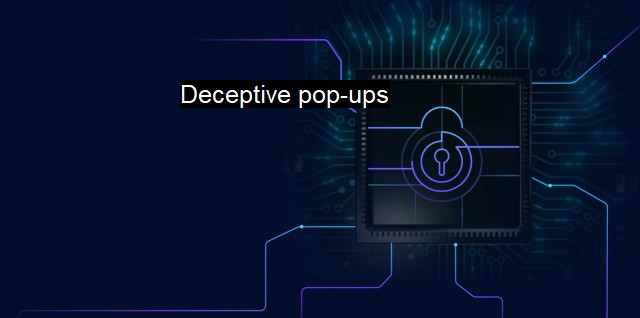What are Deceptive pop-ups?
Deceptive Pop-ups: The Growing Threat to Cybersecurity and How Antivirus Technologies Can Help Mitigate the Risks
Deceptive pop-ups, as the name suggests, are deceitful or misleading windows or messages that suddenly appear on a screen while browsing the internet. These can pose serious threats in the context of cybersecurity since they often contain misleading information designed to trick the user into taking certain actions that compromise their security.a deceptive pop-up is a technique used by cybercriminals for malevolent purposes ranging from extracting sensitive data to installing harmful software on unsuspecting users' devices. While they may appear innocuous or even helpful to the untrained eye, deceptive pop-ups often lead to issues such as malware infections, data theft, and intrusion of privacy.
Cybercriminals use various deceptive methods within their pop-ups. On some occasions, they pose as warning messages from what appears to be a legitimate source, typically impersonating reputable organizations or recognizable brands. In many cases these pop-ups instantly alert the user about nonexistent issues, such as alleged viruses on their gadget, and then propose an immediate solution that often includes providing sensitive personal or financial information or downloading malicious software disguised as antivirus or other security programs.
In other cases, pop-ups might offer enticing deals or irresistible clickbait content designed to attract the user's attention and ignite curiosity. Some even generate false urgencies or opportunities to win a contest that requires the user to ‘act immediately’. The sheer gullibility under pressure often leads people to inadvertently comply with the hacker's objectives, causing unpleasant or damaging situations.
Deceptive pop-ups are not limited to false claims, they can also be programmed to be aggressive. Despite users attempting to close these windows, some are designed to stay open or keep generating more pop-ups, further entangling the users in fields of deception until they unknowingly acquiesce to the hacker's intent.
Protection against deceptive pop-ups is usually complex for generic antivirus software, due to their intricate designs and sophisticated tactics. They often bypass traditional antivirus screenings as they generally do not impose immediate threats, making them a complex cybersecurity challenge.
There are however several key strategies that conscientious internet users could utilize to mitigate their risk. Users are encouraged to keep their antivirus software and software systems updated, not clicking on questionable links, not sharing sensitive data with non-verified sources, and strictly avoiding downloading software from unknown sources.
Yet another crucial preventive mechanism against deceptive pop-ups includes enabling browser settings that block unwanted pop-ups. Also, adopting good quality pop-up blocking and cybersecurity software that detects and filters fraudulent activities would augment one's online security by several fold. Users are also advised to be discerning about any too-good-to-be-true offers made over the internet as these are often red flags indicating potential fraud.
Cyber education to enhance one's understanding and awareness on the hazards involved with deceptive pop-ups is also instrumental in this context. The surge of such malicious activities has resulted in comprehensive online information material made available to protect users against such deceit covering all aspects, starting from what deceptive pop-ups truly are and potentially do to ways of identifying and combating them.
Deceptive pop-ups are potentially harmful nuisances heavily employed by cybercriminals to achieve malevolent objectives, such as cyber theft and malware installations. They pose significant threats against cybersecurity standards globally. Keeping updated with contemporary cyber threats, stringent practices including being cautious with pop-ups and adhering to safe browsing habits could safeguard users from falling into these cybertraps. Thus, comprehensive knowledge on deceptive pop-ups alongside effective antivirus and cybersecurity tools form a powerful armory against such online banes.

Deceptive pop-ups FAQs
What are deceptive pop-ups?
Deceptive pop-ups are ads or messages that try to trick users into taking some kind of action that could harm their device or compromise their online security.How do deceptive pop-ups work?
Deceptive pop-ups can appear on a website or in an app, and they can be triggered by clicking on a link, button, or image. They often use scare tactics to convince users that their device is infected with a virus, and then urge them to download a fake antivirus software or call a fake tech support number.How can I protect myself from deceptive pop-ups?
The best way to protect yourself from deceptive pop-ups is to install a reputable antivirus and anti-malware software on your device. This will help detect and block malicious pop-ups and warn you if you're about to download a fake program or visit a dangerous website. It's also important to update your software and browser regularly to reduce vulnerabilities that hackers could exploit.What should I do if I encounter a deceptive pop-up?
If you encounter a deceptive pop-up, do not click on any links, buttons, or images within the pop-up. Instead, close the window or tab immediately. If you suspect that your device is infected with malware, run a virus scan and remove any threats identified. You can also report the pop-up to the Federal Trade Commission (FTC) or to your antivirus provider.| | A | | | B | | | C | | | D | | | E | | | F | | | G | | | H | | | I | | | J | | | K | | | L | | | M | |
| | N | | | O | | | P | | | Q | | | R | | | S | | | T | | | U | | | V | | | W | | | X | | | Y | | | Z | |
| | 1 | | | 2 | | | 3 | | | 4 | | | 7 | | | 8 | | |||||||